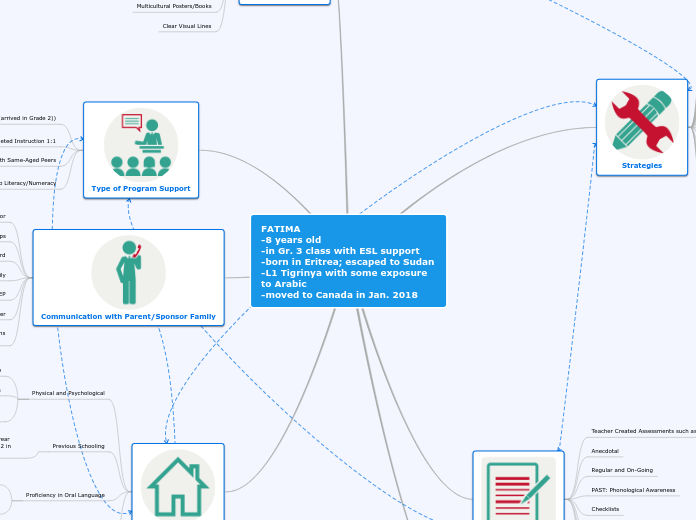FATIMA
-8 years old
-in Gr. 3 class with ESL support
-born in Eritrea; escaped to Sudan
-L1 Tigrinya with some exposure to Arabic
-moved to Canada in Jan. 2018
Factors to Consider
Academic Achievements
Making Good Progress; no red flags to suggest special
education considerations
Continue to monitor progress; alert LRT if any concerns
that may indicate special education needs
With modifications, completes math at Grade 2-3
level
Continue to provide modification and accommodations
that allow her to be successful at Grade level, continue
to pre-teach math vocabulary
Step 2 in Reading and Writing
Further guided reading and writing tasks (using decodable texts, highly visual texts, teacher frames, graphic organizers, personal dictionaries, scaffolding, editing strategies)
Proficiency in Oral Language
Step 3 Oral in English
Allow time to process, don't over-correct but model one correction, provide lots of opportunities to talk with her peers, collaborations, specific lessons on grammatical structures
Speaks Tigrinya Fluently
Encourage the use of L1 at school and home; share
her language with others
Previous Schooling
Homeschooling with 7 other refugees (in secret) for 1 year when in Sudan (had schooling in K, Gr. 1 and some Gr. 2 in Eritrean Government School)
Physical and Psychological
Dad taken by the government (not seen or heard from
in a few years)
Remembers "bad men" coming to steal children
Time Spent in Refugee Camp
Communication with Parent/Sponsor Family
Help Parents to Understand Realistic Expectations
and Goals
Use of Planner
Explain OLBs and STEP
Emails Also Sent to Sponsor Family
Explain Ontario Report Card
Encourage volunteering/Attending Field Trips
Translator
Type of Program Support
Small Group Literacy/Numeracy
Currently receives 4-5 periods a week of 1:1 or
small group (focus on reading, writing, math)
Integrated with Same-Aged Peers
Targeted Instruction 1:1
With ELL teacher, co-op student, classroom teacher, peers
ESL (arrived in Grade 2))
Had some gaps in learning but not 2 continuous
years (older brother is ELD)
Classroom
Clear Visual Lines
Multicultural Posters/Books
Materials Readily Available
Organized Space
Items Labelled
Strategic Seating
Anchor Charts
Highly Visual
Other Supports
Support to Deal with Trauma
Consider "Rainbows" program at school
Link to Citizenship and Immigration Canada
Continued Support Through Local Church
Co-op students
Provides 1:1 support
Assessments
Student-Teacher conferences
Benchmark/C.A.M. (for Reading)
Portfolios
Checklists
PAST: Phonological Awareness
Regular and On-Going
Anecdotal
Teacher Created Assessments such as Math Unit Tests
Strategies
Peer Support in L1 with Older Student
Predictable Routines
Provide Choice
Dual Language Learning
With older cousin in Grade 4
Use of Technology
gws.ala.org/category/mathematics-computers
www.aplusclick.org
www.oise.utoroton.ca/eslinfusion/Home/index.html
Google Read And Write
Google Translate
www.mathprodigy.com
www.starfall.ca
www.abcya.ca
Visuals
Multi-linguistic Approach
Teach Academic Vocabulary
Flexible Groupings
Daily Rich Read-a-Louds
Phonics/Phonemic Awareness
Teach suffixes/prefixes
Collaboration
Differentiated Instruction
Cross-Curricular Planning with all teachers/subjects
Word Families
Reduce Topics to Essential Understandings
Frequent Comprehension Checks
Personal Picture Dictionary
Allow time to process
Scaffolding
Google Read and Write

